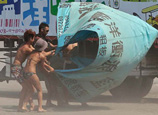
Related Reading:
>> Literary couple's letters off auction amid protest
>> Litterateur's widow claims court victory
>> Auction of literary giant's letters sparks disputes
Edited and translated by People's Daily Online
Cultural figures are different from general public figures. They have huge influences and public appeal, with responsibility of culture communication. Some of them have even become national spiritual leaders. Aside from their "material value", these cultural figures also have "spiritual value".
After Yang Jiang voiced out strong objection to the auction of personal letters belonging to her and her family, Poly Group announced on its official website the cancellation of three relevant objects. However, the Sungari Company which has auction plan on the manuscript of Qian Zhongshu's Unknown Binding has not made its final decision yet.
Auction on personal letters of cultural figures is just one of the ordinary things that happened in consumption of cultural figures. Similar cases are frequently seen. For example, ignoring Eileen Chang's will and publishing her manuscript in high profile; regardless of Mo Yan's appeal "don't go to my hometown", people flocked to his hometown to "worship" his old residence.
Every business seems to respect culture, which gives rise to consumption of cultural figures. However, their respect is actually not the case. They do not have the sense of history and sense of awe towards those cultural celebrities, but only to pick some "cultural symbols" for business purpose. Four different places have competed against each other for the title of "hometown of Cao Xueqin". We have also seen competition for "hometown of Emperor Yan" and for "hometown of Laozi". It seems that people care much about these famous historical figures, but what they really care about is their purses. If they did care, they would have done huge amount of research and archaeological excavation to reveal what these famous people were like. This kind of "hometown" is meaningful. What we usually see, however, is ignoring the core spirits of famous figures and aiming at boosting the GDP. Destroying historical buildings, building new ones to replace the original ones, those people are not grieved about damages of history and culture but concentrate on business that draws attention.
Zhou Lingfei, the first grandson of Lu Xun, said: "Some people say that every piece in Complete Works of Lu Xun is treasure, because the commercialized Lu Xun is like a gold mine, everything related brings money." With this kind of money-attracting ability, those cultural figures will naturally be attractive to many business people. We should treasure the cultural figures when we "consume" them, otherwise we will disgrace those famous figures.
Cultural figures are different general public figures. They have huge influences and public appeal, with responsibility of culture communication. Some of them have even become national spiritual leaders. Aside from their "material value", these cultural figures also have "spiritual value". If business people turn the national cultural assets to some lousy and cheap impostors, this is not only disrespectful to the specific celebrity, but also an insult to Chinese culture.
Overconsumption of cultural figures is both related to earning political performance and to impetuous status of people. In a society where people pursue profits and follow suit, we are going to lose our respect and rationality. We admit that being a cultural figure will inevitably be consumed in this consumeristic age, but we have to know that not everything of the celebrity is available for consumption. For those available parts, we cannot put economic value over cultural value. When profits erode our culture, we should have an approach to stop it.
















 China's Chongqing issues orange-coded alert of heat
China's Chongqing issues orange-coded alert of heat


![]()
